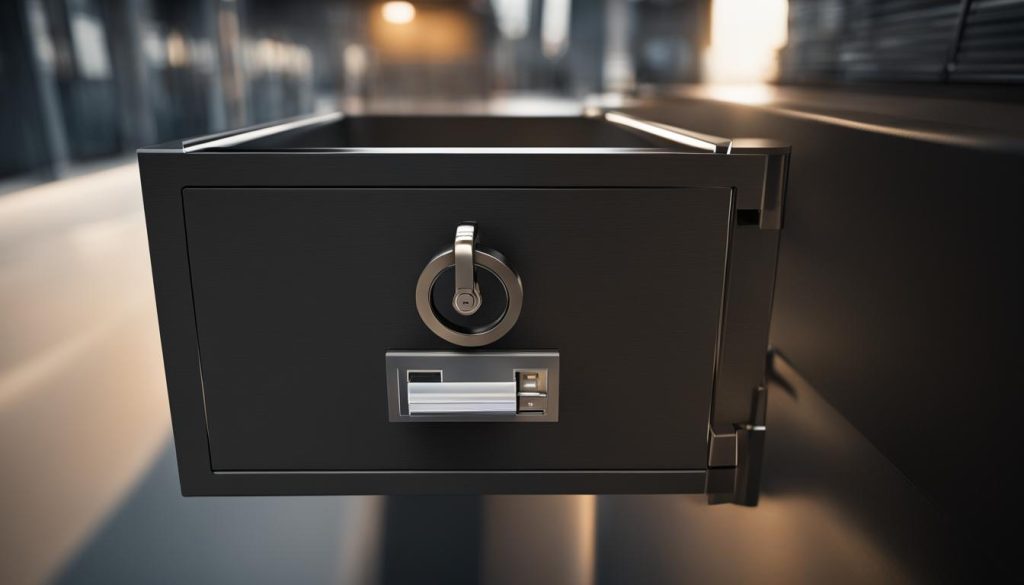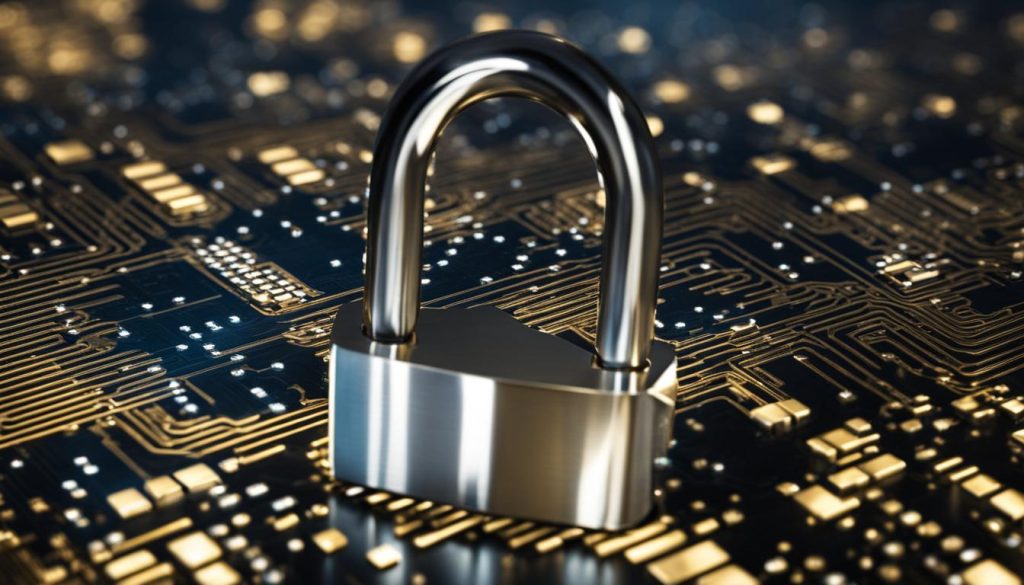Protecting your digital assets is of utmost importance when it comes to cryptocurrency. Without proper backup and recovery measures, the loss of your private keys can result in irreversible loss of funds. Understanding the different methods and best practices for cryptocurrency backup and recovery is essential for safeguarding against potential risks.
When it comes to cryptocurrency, backup and recovery are crucial. Losing your private keys can lead to financial loss and compromised security. It’s important to understand the role of private keys in cryptocurrency security and the risks associated with their loss.
Key Takeaways:
- Backing up and recovering your cryptocurrency wallet is essential for protecting your digital assets.
- Private keys are crucial for securing your cryptocurrency funds, and losing them can result in irreversible loss.
- There are different methods of backing up your cryptocurrency wallet, including paper wallets, hardware wallets, digital files, and mnemonic phrases.
- Following best practices such as regular backups, secure storage, encryption, and redundancy can enhance the effectiveness of your cryptocurrency backup.
- Various methods, including importing a wallet from a backup file or using recovery phrases, can be used for wallet recovery.
Importance of Private Keys in Cryptocurrency Security
When it comes to securing your cryptocurrency, private keys play a crucial role. These cryptographic keys grant you access and control over your digital funds, allowing you to sign transactions and verify ownership. It is essential to understand the significance of private keys in cryptocurrency security and the risks associated with their loss.
Losing access to your private keys can have serious consequences, including financial loss and compromised security. Without backup, if your private keys are lost or stolen, you may be unable to recover your funds. It is important to take proactive measures to protect your private keys and ensure their safekeeping.
“Private keys are the digital keys to your cryptocurrency kingdom. Losing them is like losing the key to a vault filled with your wealth. It’s crucial to treat private keys with the utmost care and always have a backup.”
By safeguarding your private keys, you maintain control over your cryptocurrency and reduce the risk of unauthorized access to your funds. With a secure backup of your private keys, you can restore your wallet and access your funds even if your original keys are lost or compromised. This highlights the importance of having a reliable and secure backup solution for your cryptocurrency wallets.
Protecting Your Private Keys
There are several best practices to consider when it comes to protecting your private keys:
- Never share your private keys with anyone.
- Store your private keys in a secure offline location, such as a hardware wallet or encrypted digital file.
- Regularly back up your private keys and securely store the backup files.
- Use strong passwords and encrypt your backup files for added security.
By following these best practices, you can significantly enhance the security of your cryptocurrency backup and recovery process, ensuring the safety of your digital assets.

Table: Risks of Private Key Loss
| Risk | Consequences |
|---|---|
| Funds Loss | If private keys are lost or stolen, you may never be able to recover your funds, resulting in financial loss. |
| Security Breach | Without your private keys, unauthorized individuals may gain access to your funds, compromising your financial security. |
| Irreversible Transactions | If private keys are lost, you may be unable to verify ownership and complete transactions, leading to irreversible consequences. |
Understanding the importance of private keys in cryptocurrency security empowers you to take the necessary precautions to protect your digital assets. By implementing secure backup solutions and following best practices, you can ensure the safety of your cryptocurrency investments and maintain control over your funds.
Methods of Cryptocurrency Wallet Backup
Backing up your cryptocurrency wallet is essential to safeguard your digital assets. With various backup solutions available, you can choose the method that best suits your needs. Here are some common methods for cryptocurrency wallet backup:
1. Paper Wallets
A paper wallet involves printing your wallet’s private and public keys onto a physical piece of paper. This method provides offline storage, offering increased security against online threats. However, paper wallets can be susceptible to physical damage or loss, so it’s important to store them in a safe and secure location.
2. Hardware Wallets
Hardware wallets are physical devices specifically designed for storing cryptocurrency private keys. They offer enhanced security features and protection against malware and theft. With a hardware wallet, your private keys never leave the device, providing an extra layer of security.
3. Encrypted Digital Files
Encrypting your wallet file and storing it as a digital file can be a convenient backup method. You can use encryption software to secure the file and then store it on a secure storage device or cloud service. Make sure to choose a strong password for encryption and keep it in a safe place.
4. Mnemonic Phrases
Mnemonic phrases, also known as seed phrases, are a series of words that can be used to recover your wallet. These phrases are derived from the wallet’s private key and can be written down or memorized. Mnemonic phrases provide a convenient and secure way to restore your wallet without relying on digital or physical backups.

It’s important to choose a backup method that aligns with your security preferences and storage capabilities. Consider using multiple backup methods to ensure redundancy and protect against possible failures. Remember to regularly update your backup files as you make changes to your wallet, such as generating new addresses or adding new cryptocurrencies.
Best Practices for Cryptocurrency Backup
When it comes to protecting your cryptocurrency assets, implementing best practices for backup is essential. By following these strategies, you can ensure the safety and accessibility of your funds, even in the face of potential risks or loss. Here are some key best practices to consider:
Regularly Backing Up Your Wallet
To mitigate the risk of losing access to your cryptocurrency funds, it is crucial to regularly back up your wallet. Set a schedule for regular backups, whether it’s daily, weekly, or monthly, and stick to it. This way, you’ll have a recent copy of your wallet in case of any unforeseen circumstances.
Using Secure Storage Methods
Choose a secure storage method for your wallet backup. Consider options such as hardware wallets or encrypted digital files stored in offline locations. These methods provide an added layer of protection against online threats and ensure the safety of your private keys.
Encrypting Backup Files
Encrypting your backup files adds an extra level of security to your cryptocurrency backup. Use strong encryption algorithms and secure passwords to encrypt your backup files. This way, even if someone gains access to your backup, they won’t be able to misuse your private keys.
Verifying Backup Integrity
Regularly verify the integrity of your backup files to ensure that they haven’t been corrupted or tampered with. Perform integrity checks using checksums or other verification methods to confirm that your backup files are intact and can be relied upon for recovery.
Implementing Redundancy in Backup Solutions
Don’t rely on a single backup solution. Implement redundancy by having multiple backup copies stored in different locations. This way, you’ll have fallback options in case one of your backups becomes inaccessible or compromised.
By following these best practices, you can significantly increase the security and reliability of your cryptocurrency backup. Remember that the safety of your funds depends on the precautions you take, so ensure that you prioritize backup strategies for cryptocurrencies.
Wallet Recovery Methods
In the event of wallet loss or damage, there are several methods available to help you recover your cryptocurrency funds. These recovery methods vary depending on the wallet and backup solution you have in place. Here are some common wallet recovery methods:
1. Importing a Wallet from a Backup File
If you have a backup file of your wallet, you can import it into a new wallet to regain access to your funds. This method requires you to have a backup file stored securely, such as on an external hard drive or encrypted cloud storage. Follow the specific instructions provided by your wallet provider to import the backup file and restore your wallet.
2. Restoring a Wallet Using a Recovery Phrase or Mnemonic Phrase
Many wallets provide a recovery phrase or mnemonic phrase, which is a sequence of words that can be used to restore your wallet. This recovery phrase is generated when you create your wallet and acts as a backup of your private keys. To restore your wallet using a recovery phrase, you will need to enter the correct sequence of words in the designated wallet recovery section. Make sure to keep your recovery phrase secure and confidential.
3. Utilizing Recovery Tools Provided by Wallet Apps
Some wallet apps offer built-in recovery tools that can help you recover your wallet in case of loss or damage. These tools may include specific recovery procedures or options to import backup files or enter recovery phrases. Check the documentation or support resources provided by your wallet app to understand the available recovery methods and follow the appropriate steps to restore your wallet.
Remember, it is crucial to follow the instructions provided by your wallet provider and to ensure the security of your backup files, recovery phrases, and any other sensitive information related to your wallet. By understanding and implementing the appropriate wallet recovery methods, you can regain access to your cryptocurrency funds and continue managing your digital assets.
Security Considerations for Cryptocurrency Backup
When it comes to safeguarding your cryptocurrency assets, ensuring the security of your backup is crucial. Encryption is a fundamental measure to protect your backup files from unauthorized access. By encrypting your backup files, you provide an additional layer of security that prevents anyone without the decryption key from viewing or manipulating your sensitive data. Implementing strong encryption algorithms and using secure encryption keys will help safeguard your backup files from potential threats.
Another security measure to consider is utilizing multi-signature wallet backup. Multi-signature wallets require multiple signatures, typically from different devices or individuals, to authorize transactions. This added layer of security minimizes the risk of unauthorized access to your funds if one of the signing parties becomes compromised. By incorporating multi-signature wallet backup into your backup strategy, you can significantly enhance the security of your cryptocurrency assets.
Regular integrity checks of your backup files are vital for maintaining the integrity and reliability of your backup data. By periodically verifying the integrity of your backup files, you can detect any potential data corruption or tampering. This provides an opportunity to rectify any issues and ensures that your backup files are robust and fully functional when you need to restore your wallet. Implementing backup file integrity checks as part of your backup maintenance routine is an essential security consideration.

Backup Security Checklist:
- Encrypt your backup files to protect them from unauthorized access.
- Consider multi-signature wallet backup to add an extra layer of security.
- Perform regular integrity checks of your backup files to ensure data integrity.
- Store your encryption keys and backup passwords securely.
- Choose a reputable and secure backup solution or storage medium.
Implementing strong security measures for your cryptocurrency backup is crucial to protect your digital assets. By encrypting your backup files, utilizing multi-signature wallet backup, and performing regular integrity checks, you can significantly enhance the security of your backup. Don’t overlook the importance of securely storing your encryption keys and backup passwords, as they play a critical role in maintaining the confidentiality of your backup data. By following these security considerations, you can minimize the risks associated with cryptocurrency backup and ensure the safety of your valuable assets.
Cloud Backup Solutions for Cryptocurrency
In the realm of cryptocurrency, ensuring the security and accessibility of your digital assets is of utmost importance. One effective method of safeguarding your cryptocurrency wallets is through cloud backup solutions. Cloud backup offers the convenience of remote storage, allowing you to access your backups from anywhere, at any time. With automated backup processes, you can rest assured that your data is regularly and consistently protected.
By utilizing cloud backup solutions, you reduce the risk of physical damage or loss that can occur with offline backup methods. Additionally, cloud storage provides an extra layer of protection against theft or unauthorized access to physical backup devices. With the ability to encrypt your backups before sending them to the cloud, you can further enhance the security of your cryptocurrency assets.
However, it is crucial to choose a reputable and secure cloud service provider. Conduct thorough research and select a provider that offers robust security measures, such as encryption, multi-factor authentication, and regular data backups. Remember, your cryptocurrency backups are only as secure as the cloud service you choose to store them in.
Offline Backup Methods
While cloud backup solutions offer convenience and accessibility, some individuals may prefer the added security that comes with offline backup methods. Offline backups keep your digital assets physically separated from potential online threats, minimizing the risk of unauthorized access or cyberattacks.
Offline backup methods include the use of paper wallets and hardware wallets. Paper wallets involve printing out your wallet information and storing it in a secure physical location. This method keeps your private keys offline and away from potential hacking attempts. Hardware wallets, on the other hand, are physical devices that securely store your private keys offline, offering an additional layer of protection against malware and online threats.
Before deciding on an offline backup method, it is important to carefully consider the risks and benefits. While offline solutions provide enhanced security, they may also introduce new risks such as physical damage or loss. It is recommended to have multiple backups in different secure locations, ensuring redundancy and reducing the likelihood of a complete loss of access to your cryptocurrency funds.
Overall, the choice between cloud backup solutions and offline methods depends on your individual preferences and risk tolerance. It is crucial to weigh the convenience, accessibility, and security factors when determining the most suitable backup strategy for your cryptocurrency wallets.
Wallet Backup Automation and Maintenance
In the world of cryptocurrency, ensuring the safety and security of your digital assets is of utmost importance. One crucial aspect of this security is the backup and recovery of your cryptocurrency wallets. While manually backing up your wallets can be time-consuming and prone to human error, automation can streamline the process and make it more efficient. Automating the backup process ensures that your wallets are regularly and consistently backed up, reducing the risk of data loss and providing peace of mind.
With wallet backup automation, you can set up scheduled backups or automatic cloud backups, depending on the options provided by your wallet app. This eliminates the need to manually initiate and manage backups, saving you time and effort. By automating the backup process, you can ensure that your wallet data is always up to date and securely stored, protecting your funds in case of wallet loss or damage.
Synchronization after Recovery
After performing a wallet recovery, it is important to synchronize your wallet to ensure that all recent transactions and balances are updated. Synchronization involves connecting your recovered wallet to the blockchain network and downloading the latest data. This process ensures that your wallet is fully up to date and reflects any recent activity that occurred while your wallet was inaccessible.
Depending on the wallet app you are using, synchronization after recovery may happen automatically or require manual action. It is crucial to follow the specific instructions provided by your wallet provider to ensure successful synchronization. By synchronizing your recovered wallet, you can ensure that you have an accurate and reliable view of your cryptocurrency balances and transactions.
In conclusion, wallet backup automation and synchronization after recovery are essential practices for maintaining the security and accessibility of your cryptocurrency wallets. By leveraging automation, you can ensure regular and consistent backups, reducing the risk of data loss. Furthermore, synchronization after recovery ensures that your wallet is up to date and accurately reflects your cryptocurrency holdings. By following these best practices, you can safeguard your digital assets and trade with confidence.
Cryptocurrency Backup and Recovery Considerations for Trading
When it comes to trading cryptocurrency on platforms like Immediate Edge app, it’s crucial to have a solid backup and recovery strategy in place. Trading involves frequent transactions and fluctuations in your digital assets, making it even more important to protect your funds and ensure seamless trading experiences. By following the best practices for cryptocurrency backup and recovery, you can minimize the risks associated with potential wallet loss or damage, and stay on top of your trading game.
One of the key considerations for trading cryptocurrency is to regularly back up your trading wallets and private keys. This ensures that even if your wallet gets lost or damaged, you can restore it from a backup and regain access to your funds. Backup files can be stored securely on offline devices or encrypted cloud storage, depending on your preference and level of convenience.
Alongside regular backups, it’s essential to implement proper security measures for your backup files. Encrypting your backup files adds an extra layer of protection, ensuring that even if someone gains unauthorized access to your files, they won’t be able to use them without the encryption key. Additionally, consider utilizing multi-signature wallets, which require multiple signatures for transactions, enhancing the security of your backup solution.
| Considerations for Cryptocurrency Backup and Recovery in Trading | Description |
|---|---|
| Regular Backup of Trading Wallets and Private Keys | Back up your trading wallets and private keys at regular intervals to protect against potential loss or damage. |
| Secure Storage of Backup Files | Choose secure storage options such as offline devices or encrypted cloud storage to store your backup files. |
| Encryption of Backup Files | Add an extra layer of security by encrypting your backup files, preventing unauthorized access. |
| Utilization of Multi-Signature Wallets | Consider using multi-signature wallets to increase the security of your backup solution by requiring multiple signatures for transactions. |
Having a robust backup and recovery strategy in place is essential for traders in the cryptocurrency market. By regularly backing up your trading wallets and private keys, storing backup files securely, encrypting them, and utilizing multi-signature wallets, you can safeguard your funds and ensure seamless trading experiences even in the face of wallet loss or damage. Stay ahead in the world of cryptocurrencies by following the best practices for cryptocurrency backup and recovery.
Conclusion
Cryptocurrency backup and recovery are crucial aspects of protecting your digital assets. By understanding the importance of private keys in cryptocurrency security, you can appreciate the need for effective backup and recovery methods. Whether you choose paper wallets, hardware wallets, encrypted files, or mnemonic phrases, it is essential to have a reliable backup solution in place.
Following best practices for cryptocurrency backup, such as regular backups, secure storage, encryption, and backup verification, will ensure the integrity and availability of your backup data. Additionally, implementing security considerations like encryption, multi-signature wallets, and backup file integrity checks will enhance the overall security of your backup solutions.
Cloud backup solutions offer convenience, but it is important to assess the security and reliability of the service provider. Offline backup methods, such as paper wallets or hardware wallets, provide an alternative with increased security. Automating the backup process and regularly maintaining backup files will help you stay on top of your cryptocurrency backup strategy.
Importing wallets and monitoring the backup and recovery process is essential to ensure seamless trading activities. By prioritizing cryptocurrency wallet import, backup monitoring, and maintenance, you can protect your funds and stay ahead in the world of cryptocurrencies.
FAQ
Why is backing up and recovering cryptocurrency wallets important?
Backing up and recovering cryptocurrency wallets is crucial for protecting digital assets and preventing loss of funds.
What are private keys and why are they important in cryptocurrency security?
Private keys are cryptographic keys that provide access and control over cryptocurrency funds. They are essential for signing transactions and verifying ownership, making their protection crucial.
What are the different methods of backing up cryptocurrency wallets?
The methods include paper wallets, hardware wallets, encrypted digital files, and mnemonic phrases.
What are best practices for cryptocurrency backup?
Best practices include regularly backing up wallets, using secure storage methods, encrypting backup files, verifying backup integrity, and implementing redundancy.
How can cryptocurrency wallets be recovered?
Wallet recovery methods include importing a wallet from a backup file, restoring a wallet using a recovery phrase or mnemonic phrase, or utilizing recovery tools provided by wallet apps.
What security considerations should be taken into account for cryptocurrency backup?
Implementing encryption for backup files, using multi-signature wallets, regularly checking backup file integrity, and protecting backup passwords are important security measures.
Are cloud backup solutions recommended for cryptocurrency backup?
Cloud backup solutions offer convenience, but it is important to consider the security and reliability of the cloud service provider.
How can cryptocurrency wallet backup be automated and maintained?
Wallet apps may offer features for automatic cloud backup or scheduled backups. Regular maintenance, including integrity checks and versioning, is important for backup solutions.
What backup and recovery considerations should be made for cryptocurrency trading?
Trading wallets and private keys should be backed up to ensure the safety of funds and enable seamless trading even in the event of wallet loss or damage.
What are the keywords for cryptocurrency wallet import, backup monitoring, and maintenance?
The relevant keywords are cryptocurrency wallet import, backup monitoring, and maintenance.

